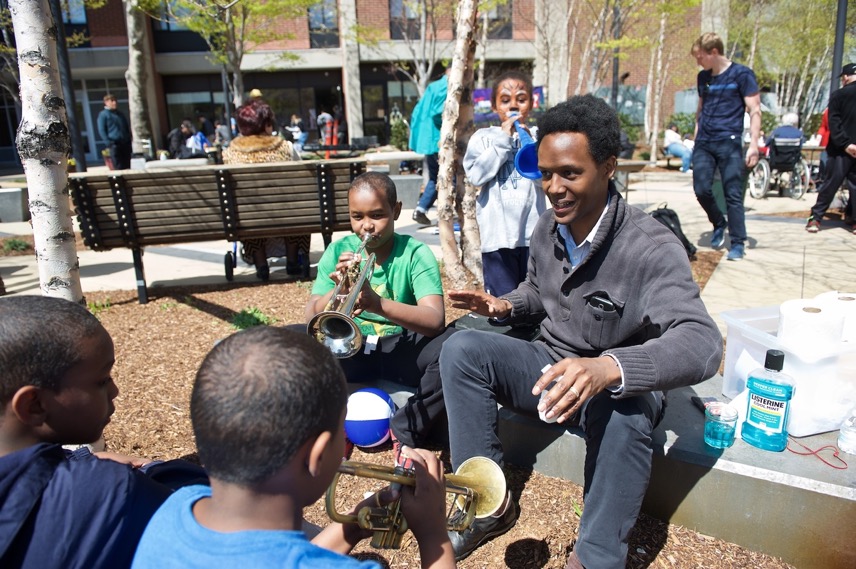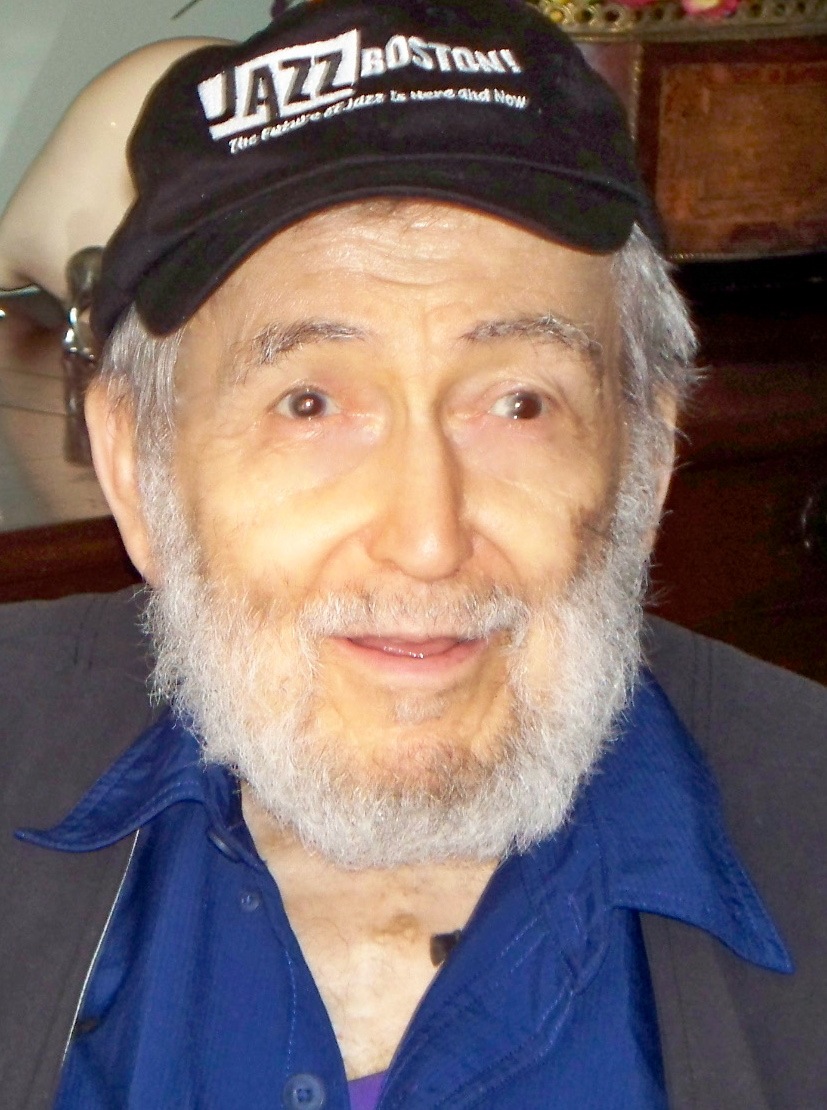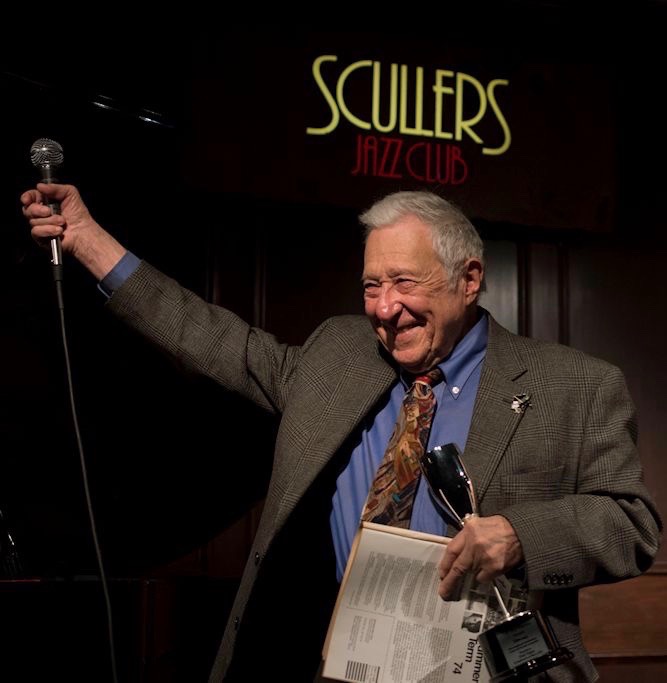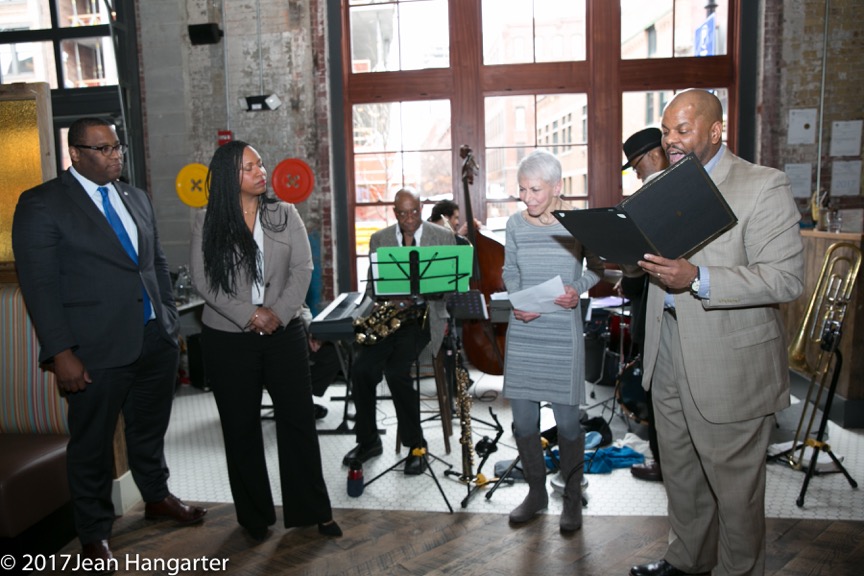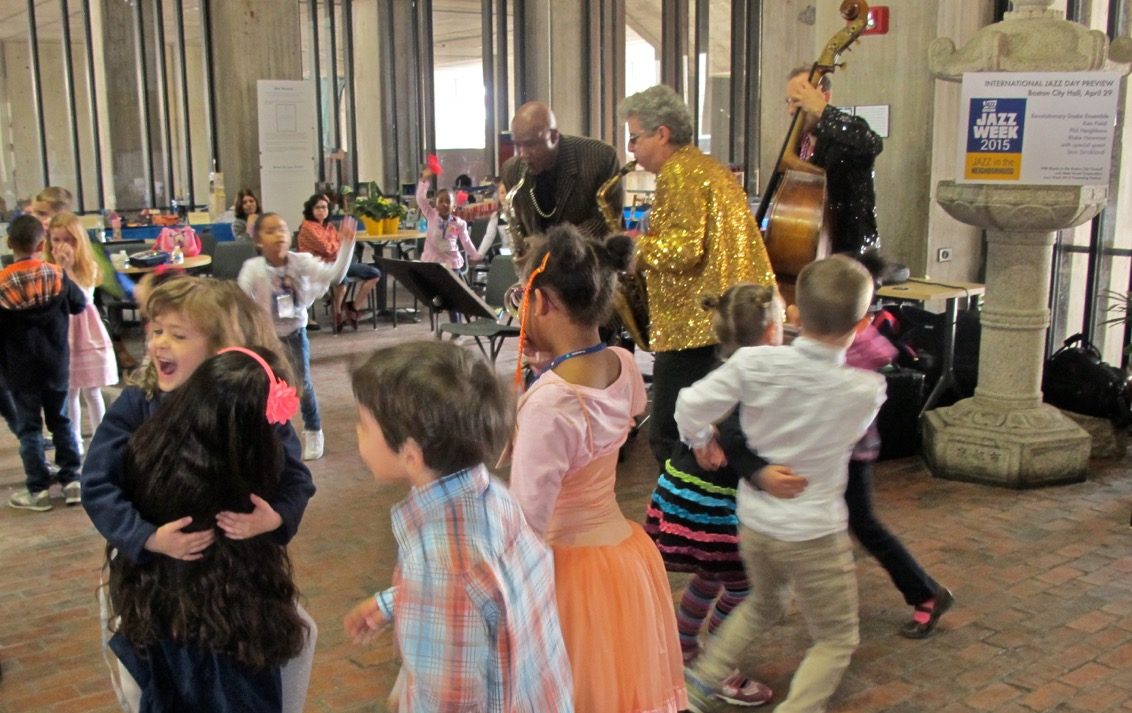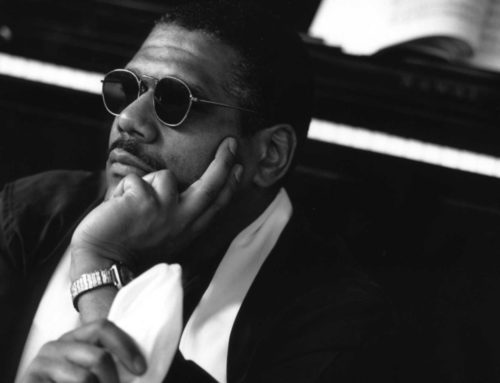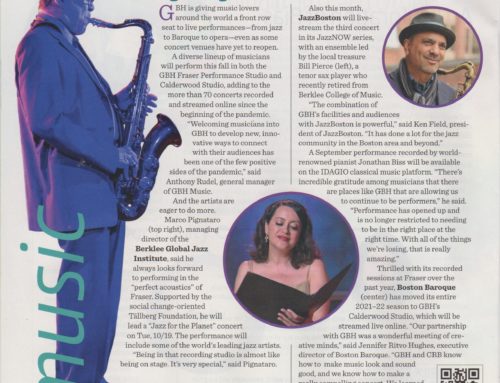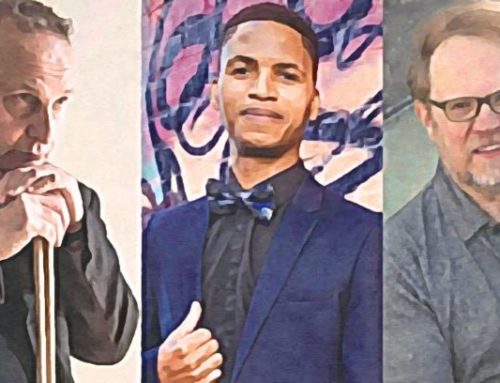Boston Voyager asked for a “fun” personal photo. Shown here: Pauline Bilsky, left, with Elynor Walcott, matriarch of the family that owns and manages Boston’s most historic jazz venue, Wally’s Jazz Café. (Jean Hangarter photo)
Today we’d like to introduce you to Pauline Bilsky.
Pauline, please share your story with us. How did you get to where you are today?
I was a senior at Wellesley College taking a music survey course when I heard the last movement of Stravinsky’s “Ebony Concerto” with its amazing clarinet solo composed for Woody Herman. “What was that?!” I said out loud. It was my first conscious encounter with jazz.
Although I came to jazz late and I’m a recent, by Boston standards, New York City transplant (2005), the Boston jazz community has become my home and JazzBoston has been my passion for the last 12 years. The role I’ve played leading JazzBoston brings together the two worlds I’ve inhabited during most of my professional life.
In the corporate world (early mornings and long days), after an 8-year stint at McKinsey & Company, where I managed the Communications Department, I set up shop as an independent communications consultant and built a clientele of CEOs and senior executives of multinationals like American Express, General Electric, and PepsiCo. In the arts world (evenings and late nights), I served for several years on the board of the New York Foundation for the Arts and then, through a serendipitous sequence of circumstances, I met Henry Threadgill (the 2016 recipient of the Pulitzer Prize for Music) and became his manager and the Executive Director of his nonprofit artist’s company. Henry’s music opened my ears, and our friendship, which survived our professional relationship, drew me into the downtown New York/Brooklyn music world. My life has revolved around jazz music and jazz musicians ever since. JazzBoston was a natural fit.
Although JazzBoston’s official birthday as a tax-exempt corporation is January 13, 2006, the organization was really born a year earlier when Boston Herald music writer Bob Young sent an email to a few colleagues describing an idea for an advocacy organization that would bring together, promote, and speak out for Greater Boston’s jazz community and help raise Boston’s profile as a great jazz city.
My husband, Don Carlson, and I were in the process of moving to Boston when Bob began assembling a small group of jazz lovers to carry his idea forward. I immediately accepted an invitation to join them. When the question of who would be the new organization’s executive director arose, I raised my hand. When we incorporated, I also became JazzBoston’s president, the title I use today.
Please tell us about JazzBoston.
JazzBoston is the only organization serving Greater Boston’s dynamic and diverse jazz community. We connect, promote, and advocate for the region’s jazz musicians, audiences and venues, and we celebrate Boston as one of the world’s great jazz cities. From the beginning, our mission has been about the music and more.
Much of what we do is designed to make people aware of the wide variety of top quality jazz available here year round and get them out to experience the music live. Jazz Week, for example, is a 10-day celebration of the music and our local scene that brings live, affordable jazz to audiences of all ages in the neighborhoods where they live, in venues ranging from clubs, restaurants, museums, and concert halls to libraries, churches, veterans’ posts, and private homes. We’ve presented Jazz Week in collaboration with musicians and venues throughout the region every year since 2007. JazzBoston provides the catalyst and promotes all events under the Jazz Week umbrella. Typically more than 100 venues participate, with new ones signing up each year.
Other programs use the power of jazz to bridge generational, ethnic, and racial divides, stimulate creativity, and improve the lives of individuals and communities. For example, we’ve delivered our Riffs & Raps® family of programs for toddlers through seniors, including a highly praised after-school series of workshops for at-risk teenagers, at Boys & Girls Clubs and every branch in the Boston Public Library system.
Most exciting right now is our partnership with The Lung Center at Brigham & Women’s Hospital. It’s a natural despite the disparity in our size because BWH is known for innovation, and there’s nothing more innovative than jazz. We’re teaming musicians and physicians in a project to develop rehabilitative therapies based on the breathing and blowing techniques of jazz wind instrumentalists and vocalists. We’re also exploring ways to use jazz to make therapy sessions more engaging and motivational, and we’ve collaborated with BWH and a neighboring community center to put on a jazzy health and wellness fair designed to increase awareness of the importance of lung health.
A spirit of advocacy infuses virtually everything JazzBoston does. We write letters, lead campaigns, testify at public hearings, and submit statements to government bodies. Sometimes we operate behind the scenes, meeting with top management and alerting media. In 2012, when WGBH eliminated all its weeknight jazz radio shows and all its jazz hosts except one, Eric Jackson, we did all those things. We got the ear of WGBH’s most senior leaders and met with radio executives to urge them not to cut further but instead to make the most of what remained, which is what they finally began doing and continue to do today.
We also launched the Campaign for the Future of Local Jazz Radio by bringing together 100+ jazz lovers at the Copley Library to come up with a true 21st-century response to the changing listening habits of young people and the trend among broadcast stations to replace music with news and talk. JazzBird®, our very cool free global jazz radio app, is the most exciting product of that campaign. The app provides 24/7 access to hundreds of great jazz shows, most with hosts, streaming live from broadcast and Internet stations all over the world. In the crowded market of streaming music, there is nothing else like it. (If you are a jazz fan reading this, check it out.)
Our next big campaign will focus on creating a Boston Jazz Heritage Trail™, similar to the Museum of African American History’s Black Heritage Trail and the Boston Freedom Trail. We’re looking for partners and sponsors now.
Great, so let’s dig a little deeper into JazzBoston’s story – What are you most proud of as an organization?
We are most proud of our success in using jazz to bridge the cultural, ethnic, and racial divides that continue to characterize life in and around Boston. Diversity is the hallmark of our most important events. The iconic portrait of 100+ members of Greater Boston’s jazz community, taken at a gathering at Wally’s Jazz Café in 2009, says it all. So does the comment we hear from guests at our annual Members and Friends Party: “This is what Boston looks like.” That’s the best compliment we can get.
Another source of pride, for JazzBoston and me personally, was attracting the attention and lavish praise of the late, great civil libertarian and jazz journalist, Nat Hentoff, who wrote about JazzBoston in three articles in JazzTimes and JAZZed in 2011 and 2012. Hentoff began his first JazzTimes article by saying, ”At last I have discovered the five-year-old JazzBoston…. In so short a time, this organization, headed by Pauline Bilsky, has become a model for organizers in other cities and regions by creatively awakening Bostonians to their city’s vital roots in the continuing history of jazz.” A year later Hentoff was one of the people who nominated me for the Jazz Journalists Association’s Boston Jazz Hero award. I’ll never forget picking up the phone the first time he called and hearing a stranger’s voice say, “This is Nat Hentoff.”
Another source of pride – and another thrill for me personally: In 2009 Harvard invited JazzBoston, as the representative of the local jazz community, to present an award to the world-renowned drummer, Roy Haynes, at the concert concluding his residency at the university. We didn’t have any awards at that time, so we created one, “The Roy Haynes Award for exceptional contributions to jazz and the jazz community,” and I presented it to Roy onstage at the Sanders Theatre. The next two recipients of the award were Eric Jackson, widely known as “the dean of New England jazz radio,” in 2011 and the ageless, irrepressible impresario Fred Taylor in 2014. We haven’t decided who will be next.
We are also proud of the friendships we’ve developed with the Boston City Council’s most ardent jazz fans, Council President Michelle Wu, Councilor-at-Large Ayanna Pressley, and Councilor Tito Jackson. The Councilors have consistently supported and encouraged us, showing up at our events, introducing formal Resolutions recognizing our efforts, and inviting us to bring a jazz band to City Hall to celebrate International Jazz Day each year. To show our appreciation, last winter JazzBoston honored all three at our Annual Members and Friends Party. We turned the tables by presenting each of them with a leather-bound Resolution pronouncing them Very Cool Councilors and proclaiming the upcoming week to be Cool Councilors Week in the City of Boston.
With a track record of stepping up in times of crisis and a network that extends across Greater Boston’s jazz community and into the broader arts community, we are looked to for leadership and we have a reputation for getting things done.
What role has luck, good or bad, played in JazzBoston’s story?
Here are a few examples of JazzBoston’s good luck, despite our official incorporation date of Friday, the 13th of January:
- When we were ready to incorporate, Volunteer Lawyers for the Arts found us the jazziest pro bono attorney around. Jay Mahler got us through the application for tax exempt status in record time and has negotiated to take us with him each time he moved to a different law firm.
- A living legend, jazz impresario Fred Taylor, and the founder of JazzBoston’s spiritual predecessor organization as well as director of the Aardvark Jazz Orchestra, Mark Harvey, agreed to join our founding board and are both still with us.
- Two extraordinary volunteers with a seemingly infinite array of technical skills and a bottomless supply of good will, Richard Mott and Paul Burega, were there for us during the design and build of our new website and continue to jump in whenever needed. Most recently, they rebuilt the coding for JazzBird® to update the app for iOS 11.
- Our first attempt to fill a staff position, a half-time Operations Director, succeeded beyond our expectations. Jon Taubman, who is also a musician, joined us 2 years ago and continues to surprise us with the range of his skills, his creativity, and his energy.
What are the challenges you face today?
JazzBoston’s internal challenges are the classic ones facing any small nonprofit organization. We need to complete the transition from an all-volunteer start-up with a working board filling all roles to a sustainable organization with an adequate staff. This is largely a fund-raising challenge.
We also need to make a successful leadership transition from founders to future. We began that process 2 years ago by expanding JazzBoston’s leadership with the election of Emmett G. Price III, former chair of Northeastern’s Department of African American Studies, national authority on the youth generation, the generation gap, and more, besides being a musician, as Chairman of the Board and Chief Executive Officer. At the same time, we elected Harry King, a media expert and veteran Boston Globe editor, as Vice Chairman. We’re exploring some innovative approaches for engaging the next generation more fully in leadership.
Chief among the external challenges is raising awareness of the importance of jazz in Boston’s cultural heritage and current cultural life. After all these years, it’s still a challenge to get Bostonians – and Americans in general – to see jazz as America’s music, an integral part of America’s cultural identity, a music at least as demanding to create and play as any other. (Those who are familiar with the dynamics of improvisation would say more so.)
Today Boston may be the most under-recognized great jazz city in the world. Looking ahead, we’d like to see Boston’s and Greater Boston’s dynamic year-round jazz scene – with its extraordinary talent, legacy, and schools – recognized as the treasure it is. We believe that building Boston’s brand as an international jazz city is one of the keys to making our city a magnet for cultural tourists and innovative enterprises from all over the world. JazzBoston is eager to work with city and state agencies to help do that.
My personal dream is to see an organization like the Chicago Jazz Partnership take shape in Boston. Shortly after the Boeing Company moved its headquarters to Chicago in 2001, the head of Boeing’s Community Investment Department assigned a new employee the task of finding something Boeing could do with its money that no one else was doing, something that was innovative and important to Chicago.
That employee found the answer in Chicago’s jazz community, where he saw monster talent but little support for the artists and organizations. Boeing stepped up, and the result was a coalition of local corporations and foundations that spurred a resurgence in Chicago’s jazz scene.
The members of the Chicago Jazz Partnership made their first joint investment, $1.5 million, in the local jazz scene in 2005, and the spectrum of support for Chicago jazz has continued to broaden ever since then. I hope Boston has a Boeing and that they’re looking for us.
Originally published on October 30, 2017 by Boston Voyager Magazine




